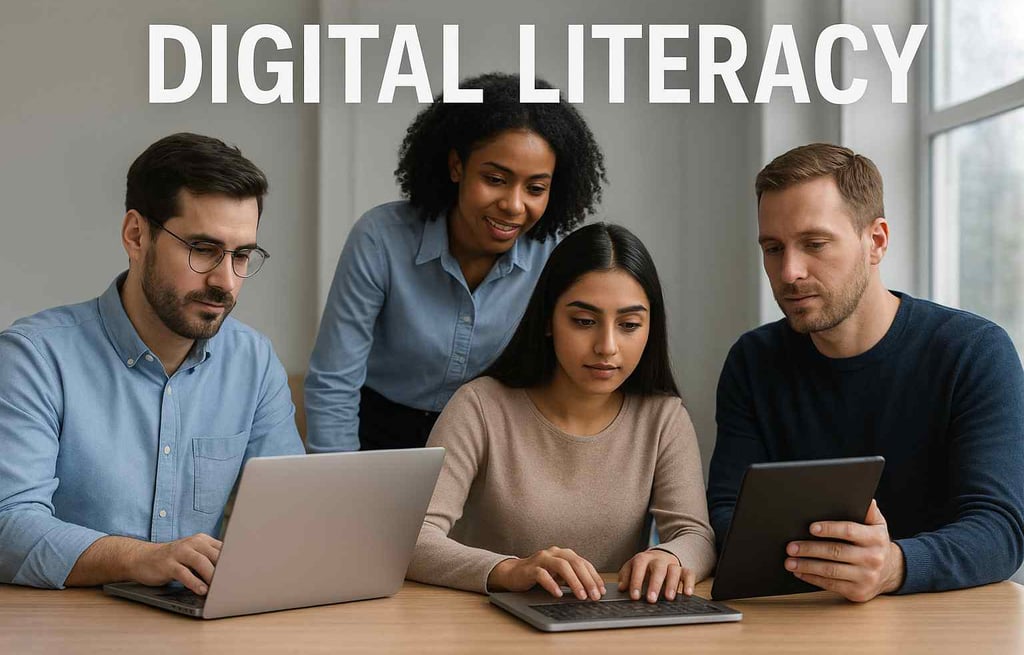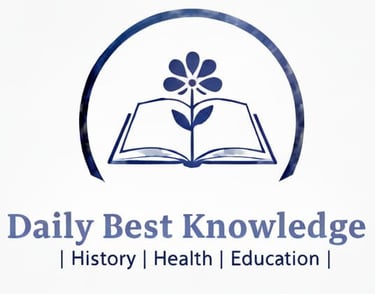DAILY BEST KNOWLEDGE
How Digital Literacy Can Transform Your Life and Career
Discover how digital literacy can transform your life and career in today’s world, why it matters, and how mastering essential digital skills can boost your education, career, and online safety.
EDUCATION
Iftikhar Ishaque Memon
7/31/20253 min read


What is digital literacy? A Complete Guide for the Modern World:
In today's fast-paced digital world, it's not enough to simply know how to use a smartphone or browse the internet. True digital literacy goes far beyond that. It's about understanding, evaluating, creating, and communicating information using digital tools smartly and responsibly. Whether you're a student, a professional, or just someone navigating everyday life, digital literacy is a skill set you can no longer afford to ignore.
Defining Digital Literacy:
Digital literacy refers to the ability to find, evaluate, utilize, share, and create content using information technologies and the internet. It involves more than just using a computer. It’s about critically engaging with digital content and tools.
The concept was first introduced in the 1990s when personal computing started to become more mainstream. Since then, it has evolved with technology to include things like digital communication, online etiquette, privacy awareness, and even cybersecurity skills.
Why Digital Literacy Matters:
In the 21st century, digital literacy is as important as reading and writing. Here’s why it matters:
1. Education:
Most schools and universities now use online learning platforms, digital textbooks, and research databases. Students are expected to not only access information online but also verify its credibility. Without digital literacy, students risk falling behind in a tech-integrated education system.
2. Workplace Readiness:
Today’s employers seek candidates who are comfortable with digital tools. From basic office software to cloud platforms and communication apps like Zoom and Slack, the modern workplace demands digital competence. Even jobs that once didn’t require tech skills, like retail or hospitality, now involve using tablets, apps, or point-of-sale systems.
3. Everyday Tasks:
From online banking to booking appointments or reading news updates, daily life is deeply intertwined with digital technology. A digitally literate person can manage these tasks efficiently and safely.
4. Combating Misinformation:
In an age of information overload, fake news and misinformation spread easily. Digital literacy teaches individuals to critically assess sources, question headlines, and verify facts before sharing or believing them.
Key Components of Digital Literacy:
To truly understand digital literacy, we need to explore its core components:
1. Technical Skills:
This includes the basic ability to operate digital devices (computers, smartphones, and tablets) and use software applications, including browsers, word processors, and spreadsheets.
2. Information Literacy:
Being able to search for information online, judge its reliability, and use it ethically is a crucial part of digital literacy. For example, understanding how to use Google effectively or evaluate the credibility of a website is a valuable skill.
3. Digital Communication:
Whether through email, messaging apps, or social media, digital communication is a big part of daily life. Digital literacy involves knowing how to communicate clearly and respectfully online, as well as understanding different communication norms across platforms.
4. Cybersecurity Awareness:
A digitally literate person understands the importance of strong passwords, recognizes phishing scams, protects personal data, and uses privacy settings wisely.
5. Media Literacy:
This is the ability to analyze, evaluate, and even create media in various forms, from blog posts to videos. It includes understanding how media messages are constructed and how they influence audiences.
6. Ethical Use of Technology:
Using digital tools responsibly means respecting copyright laws, avoiding plagiarism, and understanding digital footprints. It also means knowing how your actions online can affect others.
Examples of Digital Literacy in Action:
A teenager researching a school project uses Google Scholar to find academic articles, then cites them correctly.
A remote worker uses Zoom for meetings, Slack for team communication, and Dropbox to manage shared files.
A retiree avoids a phishing scam by recognizing a fake email and reporting it instead of clicking the link.
A content creator checks facts before posting a video and gives credit for any reused media.
Challenges to Digital Literacy:
Access to Technology: Not everyone has reliable internet access or devices at home, creating a digital divide.
Age Gap: Older generations may find it harder to adapt to rapidly evolving technologies.
Education Systems: Not all schools focus on teaching digital literacy as part of the curriculum.
Misinformation: Many people still struggle to differentiate between credible and misleading information online.
Bridging these gaps is a shared responsibility of educators, policymakers, communities, and individuals.
How to Improve Digital Literacy:
Take Online Courses: Websites like Coursera, Khan Academy, and LinkedIn Learning offer free or affordable courses.
Practice Safely: Try using new apps or tools in a controlled environment to build confidence.
Read Widely: Stay updated with technology news and trends from trusted sources.
Join a Digital Literacy Program: Many libraries and community centers offer training workshops.
Teach Others: Sharing knowledge helps you learn better and makes your community more digitally aware.
Final Thoughts:
Digital literacy is a vital life skill that empowers people to thrive in an increasingly digital world. From online learning and working remotely to protecting yourself from scams and making informed choices, being digitally literate opens doors to countless opportunities.
Whether you're a student preparing for the future, a job seeker upgrading your resume, or someone just trying to keep up with everyday tech, developing your digital literacy is one of the smartest investments you can make.
For concept of education in the views of Quaid-i-Azam, visit https://www.dailybestknowledge.online/quaid-i-azams-concept-of-education
© 2025. All rights reserved.
This platform delivers well-researched articles to empower your personal and professional life.


